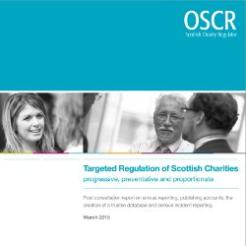The Office of the Scottish Charity Regulator has said it will develop a new approach to reviewing charities that concentrates more on high risk organisations, in a report following a consultation on its priorities.
OSCR will move away from an annual check on all charities to concentrate on high-risk charities, it said in its post consultation report, Targeted regulation of Scottish charities.
OSCR launched a consultation in the summer to assess its priorities, ten years after it was originally set up. It received 373 written responses, 253 of which came from charities – the rest from individuals, professional bodies or advisers.
The post-consultation report revealed that OSCR will change the questions included in the annual return more and make it more flexible for the regulator to adapt to changing risks.
Ahead of implementing the new return it will produce guidance for the sector.
“We will continue to move away from the routine annual check on all charity reports to develop a more integrated system from a variety of sources. This should allow us to concentrate on sub-sectors and charities that are posing a higher risk to public trust and confidence, and allow us to be more proactive as a regulator,” the report said.
Trustee database
There was concern about OSCR’s desire to establish a trustee database, with 48 per cent expressing fears around privacy and data. Almost 20 per cent were concerned that it could discourage people from becoming a trustee.
OSCR has said that it will still establish the trustee database but will not make it available to the public.
Just over half of respondents were in favour of the publication of trustee names on the register.
Publishing annual reports
OSCR also confirmed that it would push ahead with plans to publish the annual accounts of charities on its register and would start by encouraging charities to put their accounts online and provide a link on the register.
Some 70 per cent of respondents supported the proposal that charities with income over £25,000 and all Scottish Charitable Incorporated Organisations should have their accounts published online by OSCR, with 14 per cent arguing that this should apply to all charities.
Reasons people gave for not wanting to publish accounts included duplication, where a charity already published accounts online, the issue of publishing signatures and the possibility for misinterpretation of the accounts.
OSCR also said it planned to focus on charities that have persistently not filed accounts on time.
David Robb, chief executive of OSCR, said: “Our Board has approved the programme and we will now actively develop the various work strands to ensure a successful transition, and the minimum burden on charities.
“The changes are to make us more risk-based and proactive and will help focus our own resources more effectively. This programme demonstrates the positive changes we can make as charity regulator within the constraints of our current powers and recent real-term reductions in our resources.”
Serious incident reporting
OSCR had also asked for thoughts on introducing a mechanism for serious incident reporting. Nearly two-thirds of respondents supported the concept.
Some 23 per cent said more work was needed on the defining incidents and the benchmarks for when it could be considered serious.
Other measures
OSCR is looking to make more of its services available online, and encourage charities to use these rather than paper-based alternatives.
It will also develop targeted guidance for small charities about preparing annual reports and accounts.
Charities can expect to see some changes this year and more substantial changes will take place in 2016/17 when new IT systems are in place.









